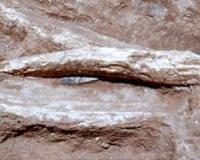 |
Tucson (UPI) Oct 13, 2010 If a medium-sized asteroid were to hit in Earth's oceans a tsunami wouldn't be the only worry, U.S. scientists say -- the ozone layer could be at risk too. A computer simulation by researchers at the Planetary Science Institute in Tucson suggests water vapor and sea salt thrown into the atmosphere could damage the protective layer and create record levels of ultraviolet radiation that could threaten life on the planet, NewScientist.com reported Wednesday. Elisabetta Pierazzo and her colleagues used global climate models to study the effect of an asteroid collision happening at sea. They focused on medium-sized asteroids, about a half-mile wide. To date, 818 asteroids that are at least that wide have been found orbiting in paths that could bring them close to Earth. The computer simulations showed such an asteroid would throw 46 billion tons of water and vapor across an area more than 600 miles wide and as much as, or more than, 100 miles above Earth's surface. Once in the atmosphere, the water and compounds containing chlorine and bromine from vaporized sea salts could destroy ozone above the atmosphere at a much faster rate than it is naturally created, the researchers say. "It will produce an ozone hole that will engulf the entire Earth," Pierazzo says. The resulting ultraviolet-radiation levels would be higher than anywhere on Earth today, the researchers say.
Share This Article With Planet Earth
Related Links Asteroid and Comet Impact Danger To Earth - News and Science
 No Evidence Found Of Catastrophic Impact In Pleistocene
No Evidence Found Of Catastrophic Impact In PleistoceneTucson AZ (SPX) Oct 04, 2010 Anthropology professor Vance T. Holliday and others take issue with claims that a comet strike led to the demise of Paleoindian megafauna hunters during the Pleistocene. The notion of an object such as a comet or asteroid striking the Earth and wiping out entire species is compelling, and sometimes there's good evidence for it. Most scientists now agree that a very large object from space ... read more |
|
| The content herein, unless otherwise known to be public domain, are Copyright 1995-2010 - SpaceDaily. AFP and UPI Wire Stories are copyright Agence France-Presse and United Press International. ESA Portal Reports are copyright European Space Agency. All NASA sourced material is public domain. Additional copyrights may apply in whole or part to other bona fide parties. Advertising does not imply endorsement,agreement or approval of any opinions, statements or information provided by SpaceDaily on any Web page published or hosted by SpaceDaily. Privacy Statement |